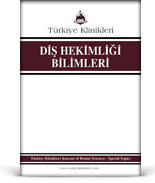Amaç: Bu çalışma, diş hekimlerinin beyin göçüne yönelik tutumlarını ve yaşam memnuniyetlerini değerlendirmek amacıyla yapılmıştır. Gereç ve Yöntemler: Çevrim içi ortamda 311 diş hekiminin katılımıyla çalışma gerçekleştirildi. Anket linki WhatsApp grupları aracılığı ile katılımcılara iletilmiştir. Veriler; Kişisel Bilgi Formu, Beyin Göçüne Yönelik Tutum Ölçeği (BGYTÖ) ve Yaşam Memnuniyeti Ölçeği (YMÖ) kullanılarak toplandı. Formda katılımcıların cinsiyet, yaş, çalıştığı kurum, unvan ve mesleki çalışma yıllarını sorgulayan 5 soru bulunmaktadır. Ölçeklerin toplam puanları arasındaki ilişki Pearson korelasyon katsayısı ile belirlendi. Ortalamalar arası farklılıklar Student ttesti ve ANOVA ile analiz edildi. Bulgular: BGYTÖ ortalama puanı 61,00±9,79, YMÖ ortalama puanı 14,15±6,06 olarak bulundu. Ölçekler arasında negatif korelasyon bulundu (r=-0,52). Yaşam memnuniyeti arttıkça, göç eğilimi azalmaktadır (p<0,001). Erkeklerin BGYTÖ puanı ortalaması (62,28±9,69) kadınların BGYTÖ puan ortalamasından (59,84±9,77) yüksek bulundu (p<0,05). Erkeklerde YMÖ puanı ortalama 14,11±5,91 olarak, kadınlarda ise 14,19±6,22 olarak bulunmuştur. Kadınlar erkeklere göre yaşamlarından daha memnun olmakla birlikte, istatistiksel olarak anlamlı fark bulunamamıştır (p>0,05). Çalışılan kurumun BGYTÖ ve YMÖ üzerine etkisi incelenmiştir. Duncan testine göre üniversitede çalışan diş hekimlerinin BGYTÖ ortalama puanları istatistiksel olarak anlamlı derecede düşük bulunmuştur (p<0,001). Sonuç: Yaşam memnuniyeti ve beyin göçüne yönelik tutum arasında negatif korelasyon olduğu, erkek ve uzman olmayan diş hekimlerinin göçe daha istekli olduğu tespit edildi.
Anahtar Kelimeler: Diş hekimleri; yaşam kalitesi; uluslararası göç
Objective: This study was conducted to evaluate the attitudes of dentists towards brain drain and their life satisfaction. Material and Methods: The study was conducted online with the participation of 311 dentists. The survey link was sent to the participants via WhatsApp groups. Data were collected using ''Personal Information Form'', ''Attitude Scale for Brain Drain (ASBD)'' and ''Scale for Life Satisfaction (SLS)''. There are 5 questions in the form that question the gender, age, institution, degree and professional years of work of the participants. The relationship between the total scores of the scales was determined by the Pearson correlation coefficient. Differences between means were analyzed with Student's t-test and ANOVA. Results: The mean score of the ASBD was 61.00±9.79, and the mean SLS was 14.15±6.06. A negative correlation was found between the scales (r=- 0.52). As life satisfaction increases, the tendency to migrate decreases (p<0.001). The mean ASBD's score of the males (62.28±9.69) was found to be higher (p<0.05) than the mean of the females (59.84±9.77). The mean score of SLS was found to be 14.11±5.91 in males and 14.19±6.22 in females. Although females were more satisfied with their lives than males, no statistically significant difference was found (p>0.05). The effect of the institution studied on ASBD and SLS was examined. According to Duncan test, the mean ASBD score of dentists working at university was found to be statistically significantly lower (p<0.001). Conclusion: It was determined that there was a negative correlation between life satisfaction and attitude towards brain drain, and male and non-specialist dentists were more willing to migrate.
Keywords: Dentists; quality of life; international migration
- Vatansever Deviren N, Daşkıran F. Yurt dışında eğitim görüp geri dönen öğretim elemanlarının beyin göçüne bakışı: Muğla Sıtkı Koçman Üniversitesi örneği [Faculty members's studied in abroad and returned, view to brain drain: case of Mugla Sıtkı Kocman University]. Dumlupınar Üniversitesi Sosyal Bilimler Dergisi. 2014(41):1-10. [Link]
- Ateş İ, Aysu Köksal Y. Beyin göçü-mutluluk ilişkisi: Türkiye'de akademisyenler için ampirik bir analiz [Brain drain-happiness relationship: an empirical analysis for academics in Turkey]. Aydın İktisat Fakültesi Dergisi. 2021;6(2):63-82. [Crossref]
- Elveren AY. Brain Drain and Gender Inequality in Turkey. 1st ed. Cham: Springer; 2018. [Crossref]
- Bakırtaş T, Kandemir O. Gelişmekte olan ülkeler ve beyin göçü: Türkiye örneği [Developing countries and brain drain: example of Turkey]. Kastamonu Eğitim Dergisi. 2010;18(3):961-74. [Link]
- Easterly W, Nyarko Y. Is the Brain Drain Good For Africa? Brookings Global Economy and Development Working Paper; 2008. [Crossref]
- Öncü E, Selvi H, Vayısoğlu SK, Ceyhan H. Hemşirelik öğrencilerinde Beyin Göçüne Yönelik Tutum Ölçeği geliştirilmesi: güvenirlik ve geçerlik çalışması [Development of an Attitude Scale for Brain Drain among nursing students: a reliability and validity study]. Cukurova Med J. 2018;43(1):207-15. [Crossref]
- Lavallee LF, Hatch PM, Michalos AC, McKinley T. Development of the Contentment with Life Assessment Scale (CLAS): using daily life experiences to verify levels of self-reported life satisfaction. Soc Indic Res. 2007;83(2):201-44. [Crossref]
- Akın A, Yalnız A. Yaşam Memnuniyeti Ölçeği (YMÖ) Türkçe Formu: geçerlik ve güvenirlik çalışması [Turkish version of Contentment with Life Scale (CLAS): the study of validity and reliabılity]. Elektronik Sosyal Bilimler Dergisi, 2015;14(54):95-102. [Link]
- Kılıç S. Cronbach'ın alfa güvenirlik katsayısı [Cronbach's alpha reliability coefficient]. Journal of Mood Disorders. 2016;6(1):47-8. [Link]
- Akman V. Factors influencing international student migration: a survey and evaluation of Turkey's case. IJCRB. 2014;5(11):390-415. [Link]
- Mollahaliloğlu S, Çulha ÜA, Kosdak M, Öncül HG. The migration preferences of newly graduated physcians in Turkey. MJIAS. 2014;22(2):69-75. [Crossref]
- Babataş G. Beyin göçü ve Türkiye'nin sosyo ekonomik yapısının beyin göçüne etkisi [Brain drawn and the impact of Turkey's socio-economical structure on it]. Öneri Dergisi. 2007;7(28):263-6. [Crossref]
- Taylor CE, Dirican R, Deuschle KW. Health Manpower Planning in Turkey: An International Research Case Study. 1st ed. Maryland: The John Hopkins; 1968.
- Astor A, Akhtar T, Matallana MA, Muthuswamy V, Olowu FA, Tallo V, et al. Physician migration: views from professionals in Colombia, Nigeria, India, Pakistan and the Philippines. Soc Sci Med. 2005;61(12):2492-500. [Crossref] [PubMed]
- Polgreen LA, Simpson NB. Happiness and international migration. J Happiness Stud. 2011;12(5):819-40. [Crossref]
- Otrachshenko V, Popova O. Life (dis) satisfaction and the intention to migrate: evidence from central and eastern Europe. J Socio Econ. 2014;48(2):40-9. [Crossref]
- Graham C, Markowitz J. Aspirations and happiness of potential Latin American immigrants. J Soc Res Policy. 2011;2(2):9-25. [Link]







.: İşlem Listesi